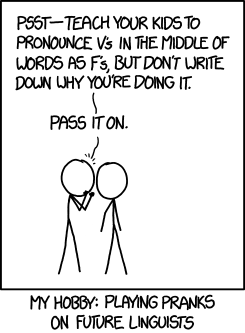Linguistic pranks
« previous post | next post »
Today's xkcd, headlined "Intervocalic Fortition":

Mouseover title: "These pranks happen all the time. English doesn't allow one-syllable words to end in a lax vowel, so writers on The Simpsons decided to mess with future linguists by introducing the word 'meh.'"
For the truth about meh, see "Three scenes in the life of 'meh'", 2/26/2012. Of course there are other and older exceptions to English final-vowel phonotactics, including duh, which J.E. Lighter's Historical Dictionary of American Slang traces back to a 1943 Merrie Melodies cartoon.
The scholarly literature on "intervocalic fortition" specifically is slim, so far. But there's a distinguished tradition of research on the broader topic of phonological changes that might look like linguistic pranks , starting with Emmon Bach and Robert Harms, "How do languages get crazy rules", Linguistic change and generative theory 1972; and continuing with Staffan Hellberg, "Unnatural Phonology", Journal of Linguistics 1978; Stephen Anderson, "Why phonology isn't 'natural'", Linguistic Inquiry 1981; and so on.
Yesterday's xkcd strip also centers on a linguistic prank, though at a different level of linguistic analysis:

Mouseover title: "Lambda calculus? More like SHAMbda calculus, amirite?"
Pflaumbaum said,
June 22, 2016 @ 7:03 am
Many Mancunians have final [ɪ~ɛ] in words that end in standard /iː/
Francois Lang said,
June 22, 2016 @ 7:23 am
For the non-expert linguists (e.g., me),
http://www.explainxkcd.com/wiki/index.php/1697
was very enlightening about Intervocalic Fortition.
Lazar said,
June 22, 2016 @ 7:29 am
@Pflaumbaum: Yes, and so too for the many other dialects that lack "happy" tensing. But the sound there is part of the weak vowel system (along with /ǝ/ and various others), which tends to operate differently from the stressable vowels. A Mancunian would surely find [ˈbɪ] *bih as unnatural as any other English speaker.
Pflaumbaum said,
June 22, 2016 @ 7:43 am
Good point Lazar
KeithB said,
June 22, 2016 @ 8:05 am
Kind of on topic. I find the "count the f's in a section" exercise amazing since you have to really think to count the f's that are pronounced as "v" as in "of".
leoboiko said,
June 22, 2016 @ 8:27 am
@KeithB I find that exercise trivial. On the other hand, I spent like 10 years pronouncing "of" as /ʌf/ (well, [ɔf], actually, because the /ɔ,ʌ/ distinction is hard). Even now I probably mispronounce it sometimes.
Are there any other English words where a /v/ sound is spelled ‹f›?
Terry Hunt said,
June 22, 2016 @ 8:47 am
@ leoboiko
In some Welsh and West Scottish accents, they all are.
rusty linguist said,
June 22, 2016 @ 9:08 am
Damn thing tricked me (or perhaps I tricked myself). I was thinking it should have been Intervocalic Lenition instead of Intervocalic Fortition.
Guess I'm just rusty and equated fortition with voicing (more vocal cord effort) and lenition with voiceless (less vocal cord effort), rather than looking at effort of change in state.
I should have known better than to say "AHA! XKCD got it wrong!" as my first instinct.
Lazar said,
June 22, 2016 @ 9:10 am
Are there any other English words where a /v/ sound is spelled ‹f›?
The closest thing I'm aware of is the use of /v/ in Stephen and (archaically) nephew.
Ellen K. said,
June 22, 2016 @ 9:26 am
Are there any other English words where a /v/ sound is spelled ‹f›?
It's a name, and a ph rather than an F, but Stephen comes to mind. And a little exploration on the internet finds nephew in British pronuncation has having (or sometimes having) a V sound.
KeithB said,
June 22, 2016 @ 9:49 am
There is "whereof." 8^)
Aaron Toivo said,
June 22, 2016 @ 10:54 am
For fun, some more exceptions to the lax-vowel rule…
/ɛ/ heh, ehh, meh
/ʌ/ phở, duh, huh?, uhh
/æ/ yeah, waaah (baby-cry onomatopeia)
I know of no examples with /ʊ/ or /ɪ/.
leoboiko said,
June 22, 2016 @ 10:55 am
Thanks, friends! I'd definitely say "Stephen" with a /f/ without the hint. Wiktionary has
/ˈstiːvən/ or, "less frequently", /ˈstɛfən/; the latter is what it sounded in my mind, vowel and all.
Gregory Kusnick said,
June 22, 2016 @ 11:45 am
leoboiko: In the US, /ˈstɛfən/ is usually spelled "Stefan".
Eric Baković said,
June 22, 2016 @ 3:24 pm
See also "grammatical virus theory" as outlined in Sobin (1997), "Agreement, Default Rules, and Grammatical Viruses," LI 28, pp. 318-343 (https://www.jstor.org/stable/4178979) — more morphosyntax than phonology, but still.
Eurobubba said,
June 22, 2016 @ 3:25 pm
It took me a while, but I eventually realized that this was what bothered me most about "Czechia" (che-ki-ya — sorry, no IPA keyboard) as a proposed short name for the Czech Republic.
Lazar said,
June 22, 2016 @ 4:58 pm
Nah, I don't believe "Czechia" violates English phonotactics any more than, say, "pluckier" or "Libya".
Jay Sekora said,
June 22, 2016 @ 8:21 pm
@Aaron Toivo, when I was a grade-schooler in rural Illinois in the ’70s, the other little boys used /pʊ/ as an insult (a very slightly disguised shortening of “pussy”). That’s the only /ʊ/ example I can think of, but I think that kind of shortening is a productive process.
Francis Boyle said,
June 23, 2016 @ 2:25 am
"The closest thing I'm aware of is the use of /v/ in Stephen and (archaically) nephew."
Hey, who are you calling archaic. I know introspection is not an infallible guide but I can't imagine not using the /v/ there. Of course, I'm a speaker of Australian English who grew up before the near total dominance so American media so I
supposeguess I might just be an archaism.David Marjanović said,
June 23, 2016 @ 5:14 am
Me neither. I use the Windows character map: Start > All Programs > Accessories* > System Programs > Character Map. After the first use it shows up in the start menu.
The Mac has a character map, too, but I don't know where it's hidden.
* …because where else than in "Accessories" would you ever put "System Programs". *facepalm*
rusty linguist said,
June 23, 2016 @ 7:51 am
Always keep https://r12a.github.io/pickers/ipa/ bookmarked.
build your IPA + complex diacritic combinations, then copy/paste them wherever you need. Great for little things like blog posts/comments on the run :)
Terry Hunt said,
June 23, 2016 @ 9:07 am
@ leoboiko
Re my earlier comment, I misread your query as "pronounced" ." Apologies.
Mac said,
June 23, 2016 @ 2:55 pm
@KeithB I doubt that the difficulty with counting those f's comes English Phonology, because I remember finding it long before I spoke enough English to know they were [v] and I still miscounted, and so did other people I know who didn't speak English. It has to be something about the graphs "of" that throws people off regardless of pronunciation.